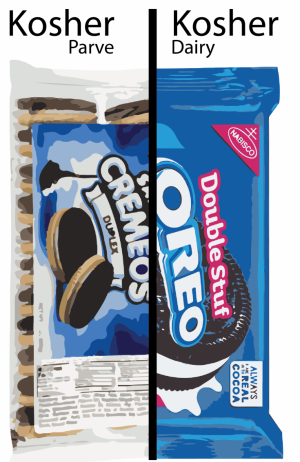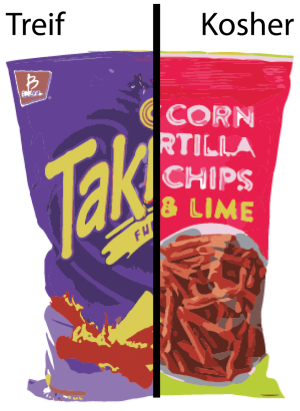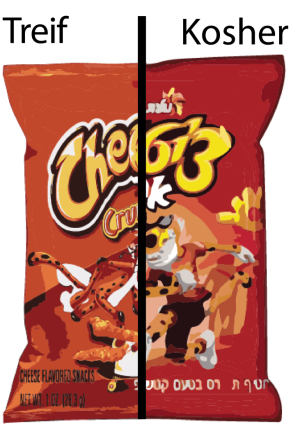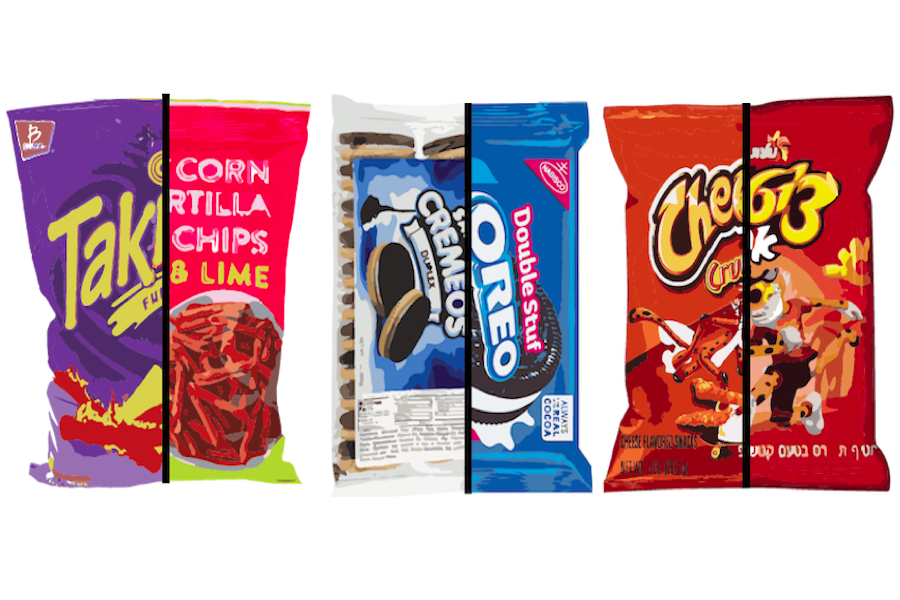Kosher knockoffs offer a taste of the wide world of American snacks
October 28, 2019
BP Graphics by Zev Kupferman
Sandwich Cremeos. Chips a Plenty. Elite Cheetos Crunch. Chesters Puffcorn. Chili & Lime Rolled Corn Tortilla Chips.
What do all these snacks have in common?
You may not have heard of them, but they are all 100 percent kosher-certified.
The American snack industry produces tens of billions of dollars in revenue each year. Within this market, according to the Boston Globe, over 40 percent of the U.S.’s packaged food and beverages are certified kosher, making kosher food a $13 billion industry.
Some Shalhevet students like kosher snacks and some don’t, but those who eat them are very grateful that they’re here.
“They’re delicious,” said junior Gaby Bentolila, when spotted with a bag of Elite Cheetos, “and I think that making kosher snacks is great and gives Jewish people an opportunity to eat these snacks and still keep kosher.”
According to YPulse, a website that does research on Generation Z and millenials, among Gen Z’s favorite snacks are Oreo, Cheetos and a variety of other junk foods, some certified kosher and some not. Many of these American favorites have been replicated by kosher food brands, and can be found on the shelves of kosher markets around the country.
In a poll conducted by the Boiling Point on which kosher snacks students prefer, Trader Joe’s Takis were the overwhelming favorite, with 37 votes, followed by kosher Cheetos cheese puff snacks with 23 votes. Sixty-four students participated in the poll, taken on paper Sept. 16.
The third-favorite kosher snack was Oreos, coming in with five votes.
Imitation Takis are so popular that junior Allesandra Judaken handed them out as part of her campaign for SAC Vice Chair last year.
“ I like to call them Jewish drugs, or a Jewish addiction,” said

Allesandra, who lost the election in spite of the snack. “People seemed to love them. They were a big hit, a lot of people asked for seconds. I saw them all over campus the entire day.”
Officially named “Trader Joe’s Rolled Corn Tortilla Chips – Chili & Lime Flavored,” Trader Joe’s Takis are said to be very comparable to Takis Fuego, made by Barcel USA.
Takis Fuego, according to the food’s website, offer “an intense flavor combination of hot chili pepper and lime.” But they’re not certified kosher.
The Trader Joe’s version alludes to the non-kosher snack without explicitly mentioning it in the product description.
“Compared to similar snacks available elsewhere, these gluten-free Chips are cut & rolled a little thicker for additional crunch,” the website says. “They’re also crispier, since we’ve reduced the amount of water in them before they hit the fryer.”
Asked in the Boiling Point poll whether there were any non-kosher snacks they wish they could get kosher, no one said they wished they could have regular Takis — suggesting that the Trader Joe’s version is good enough.
Cheetos — crunchy cheese puffs normally made by Frito-Lay, are made kosher in Israel and marketed there by Elite Brand. Shalhevet students can be found snacking on the foreign cheese puffs often, as they can be purchased in local American kosher markets.
“It’s good having the kosher option,” said sophomore Jonah Ackermann. “It makes it easier to keep kosher that way, and I have the access to good kosher snacks.”
Other students, however, find the knock-offs unappetizing, unnecessary or both.
“They don’t taste good,” said sophomore Barbara Seruya, who said the only kosher snack she likes are Trader Joe’s Takis.
“I think the idea is good that they are trying to make it so that we can have these snacks,” Barbara said. “They just don’t end up tasting good.”
Some students admit that they don’t like kosher snacks simply because they prefer the original non-kosher versions.

“I just eat the non-kosher ones,” said sophomore Eitan Jalali in an interview with the Boiling Point. “I tried the Takis from Trader Joes — they’re eh. I just like Takis better. They’re just like, sweeter — I don’t know. They just taste better.”
Dairy versus parve is another area where knock-off snacks can be helpful. For example, Oreos — Gen Z’s snack of choice, according to YPulse — is certified kosher dairy. Kids who keep kosher can eat them, but not right after eating meat.
Oreos were certified kosher in 1997, meaning they’ve been around for 22 years. But despite this, kosher brands have replicated the treat, among them with Paskez’ Duplex Sandwich Cookies and Lieber’s Sandwich Cremeos, which share not only most of Oreos’ name but their iconic blue packaging.
Most kosher imitations of mainstream snacks are “parve,” meaning they are neither dairy nor meat (vegetables and fruits, for example, are parve).
Market owners in the Pico-Robertson neighborhood said the non-dairy alternative is an important selling point for those brands.
“One of the reasons that they needed to have these is because Lieber’s and Paskez are pareve, but Oreo is dairy,” says Mr. Farzad Kohanzadeh, the owner of Livonia Glatt. “So when you have your lunch or dinner and you want to have something that is similar to Oreo snacks, if you have had meat, you cannot have Oreos because they are dairy…
“I guess pretty much it’s just that kosher manufacturers are trying to expand and distribute throughout the whole world,” said Mr. Kohanzadeh. “You see these products in Israel, like for example Liebers and Paskesz, or even in England, or anywhere else in the world where there is a Jewish population.”
Both kosher and non-kosher products are copied by the kosher specialty companies — but sometimes, made in kosher versions by the companies themselves. For example, Tillamook Cheddar Cheese, which is normally not kosher, makes a kosher line called Tillamook Kosher Medium. It’s harder to find, but stores in Jewish neighborhoods — including Trader Joe’s in Culver City and sometimes in Ralph’s on Beverwil — usually have them in stock.
 In the snack realm, Frito Lay’s “Cheetos,” adorned with a “Chester Cheetah” logo on their packaging, are not certified kosher. But the company also offers a similar snack called “Chester’s Puffcorn,” which features the same Chester Cheetah logo as Cheetos and even shares flavors. For example, there is a Chesters product called “Chester’s Flamin’ Hot Puffcorn Snack” just as there is a “Cheetos Crunchy Flamin’ Hot Cheese Flavored Snack.”
In the snack realm, Frito Lay’s “Cheetos,” adorned with a “Chester Cheetah” logo on their packaging, are not certified kosher. But the company also offers a similar snack called “Chester’s Puffcorn,” which features the same Chester Cheetah logo as Cheetos and even shares flavors. For example, there is a Chesters product called “Chester’s Flamin’ Hot Puffcorn Snack” just as there is a “Cheetos Crunchy Flamin’ Hot Cheese Flavored Snack.”
And in Israel, Cheetos themselves — the real thing — are sold by the Israeli brand Strauss, featuring the exact same name spelled in Hebrew, and Chester Cheetah too. They are certified kosher, and advertised prominently on the website of Strauss.
“Cheetos, the crunchy cheese flavored snack in the nostalgic red bag, ‘immigrated’ to Israel from the US in the early 1990s,” says Strauss on its website.
Strauss merged with the Elite brand in 2004 to form Strauss-Elite. According to the Strauss- Elite website, the company partnered with Frito-Lay in 1998, wanting to compete in the salty snack market. This granted Strauss-Elite access to Frito-Lay trademarked snacks, with the two companies agreeing to take 50 percent each of the profit from the merged products.
Considering that Strauss’s foods are already hugely popular in Israel — and that it’s a multi-national corporation with 14,000 employees and that’s traded on the Tel Aviv 35 Index — why even talk about sharing profits? Why would an Israeli brand want to work with Frito-Lay?
Maybe because of the colorful logos, catchy names and international recognition of Frito-lay products.
Or maybe to increase its share of the $13 billion American market in kosher foods.
